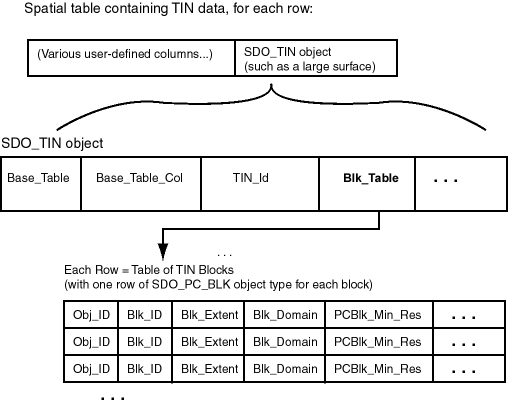2.5 TIN-Related Object Types
This topic describes the object types related to support for triangulated irregular networks (TINs),
Note:
TIN object types are supported only if Oracle JVM is enabled on your Oracle Autonomous Database Serverless deployments. To enable Oracle JVM, see Use Oracle Java in Using Oracle Autonomous Database Serverless for more information.Parent topic: Spatial Data Types and Metadata
2.5.1 SDO_TIN Object Type
The description of a TIN is stored in a single row, in a single column of object type SDO_TIN in a user-defined table. The object type SDO_TIN is defined as:
CREATE TYPE sdo_tin AS OBJECT (base_table VARCHAR2(70), base_table_col VARCHAR2(1024), tin_id NUMBER. blk_table VARCHAR2(70), ptn_params VARCHAR2(1024), tin_extent SDO_GEOMETRY, tin_tol NUMBER, tin_tot_dimensions NUMBER, tin_domain SDO_ORGSCL_TYPE, tin_break_lines SDO_GEOMETRY, tin_stop_lines SDO_GEOMETRY, tin_void_rgns SDO_GEOMETRY, tin_val_attr_tables SDO_STRING_ARRAY, tin_other_attrs XMLTYPE);
The SDO_TIN type has the attributes shown in Table 2-6.
Table 2-6 SDO_TIN Type Attributes
| Attribute | Explanation |
|---|---|
|
BASE_TABLE |
Name of the base table containing a column of type SDO_TIN |
|
BASE_TABLE_COL |
Name of the column of type SDO_TIN in the base table |
|
TIN_ID |
ID number for the TIN. (This unique ID number is generated by Spatial. It is unique within the schema for base tables containing a column of type SDO_TIN.) |
|
BLK_TABLE |
Name of the table that contains information about each block in the TIN. This table contains the columns shown in Table 2-7. |
|
PTN_PARAMS |
Parameters for partitioning the TIN |
|
TIN_EXTENT |
SDO_GEOMETRY object representing the spatial extent of the TIN (the minimum bounding object enclosing all objects in the TIN) |
|
TIN_TOL |
Tolerance value for objects in the TIN. (For information about spatial tolerance, see Tolerance.) |
|
TIN_TOT_DIMENSIONS |
Total number of dimensions in the TIN. Includes spatial dimensions and any nonspatial dimensions, up to a maximum total of 9. |
|
TIN_DOMAIN |
(Not currently used.) |
|
TIN_BREAK_LINES |
(Not currently used.) |
|
TIN_STOP_LINES |
(Not currently used.) |
|
TIN_VOID_RGNS |
(Not currently used.). |
|
TIN_VAL_ATTR_TABLES |
SDO_STRING_ARRAY object specifying the names of any value attribute tables for the TIN. Type SDO_STRING_ARRAY is defined as |
|
TIN_OTHER_ATTRS |
XMLTYPE object specifying any other attributes of the TIN. (For more information, see the Usage Notes for the SDO_TIN_PKG.INIT function.) |
Figure 2-2 shows the storage model for TIN data, in which the TIN block table (specified in the BLK_TABLE attribute of the SDO_TIN type) stores the blocks associated with the SDO_TIN object.
The TIN block table contains the columns shown in Table 2-7.
Table 2-7 Columns in the TIN Block Table
| Column Name | Data Type | Purpose |
|---|---|---|
|
BLK_ID |
NUMBER |
ID number of the block. |
|
BLK_EXTENT |
SDO_GEOMETRY |
Spatial extent of the block. |
|
BLK_DOMAIN |
SDO_ORGSCL_TYPE |
(Not currently used.) |
|
PCBLK_MIN_RES |
NUMBER |
For point cloud data, the minimum resolution level at which the block is visible in a query. The block is retrieved only if the query window intersects the spatial extent of the block and if the minimum - maximum resolution interval of the block intersects the minimum - maximum resolution interval of the query. Usually, lower values mean farther from the view point, and higher values mean closer to the view point. |
|
PCBLK_MAX_RES |
NUMBER |
For point cloud data, the maximum resolution level at which the block is visible in a query. The block is retrieved only if the query window intersects the spatial extent of the block and if the minimum - maximum resolution interval of the block intersects the minimum - maximum resolution interval of the query. Usually, lower values mean farther from the view point, and higher values mean closer to the view point. |
|
NUM_POINTS |
NUMBER |
For point cloud data, the total number of points in the POINTS BLOB |
|
NUM_UNSORTED_POINTS |
NUMBER |
For point cloud data, the number of unsorted points in the POINTS BLOB |
|
PT_SORT_DIM |
NUMBER |
For point cloud data, the number of spatial dimensions for the points (2 or 3) |
|
POINTS |
BLOB |
For point cloud data, BLOB containing the points. Consists of an array of points, with the following information for each point:
|
|
TR_LVL |
NUMBER |
(Not currently used.) |
|
TR_RES |
NUMBER |
(Not currently used.) |
|
NUM_TRIANGLES |
NUMBER |
Number of triangles in the TRIANGLES BLOB. |
|
TR_SORT_DIM |
NUMBER |
(Not currently used.) |
|
TRIANGLES |
BLOB |
BLOB containing the triangles. Consists of an array of triangles for the block:
|
For each BLOB in the POINTS column of the TIN block table:
-
The total size is (tdim+1)*8, where tdim is the total dimensionality of each block.
-
The total size should be less than 5 MB for Oracle Database Release 11.1.0.6 or earlier; it should be less than 12 MB for Oracle Database Release 11.1.0.7 or later.
You can use an attribute name in a query on an object of SDO_TIN. Example 2-6 shows part of a SELECT statement that queries the TIN_EXTENT attribute of the TERRAIN column of a hypothetical LANDSCAPES table.
Example 2-6 SDO_TIN Attribute in a Query
SELECT l.terrain.tin_extent FROM landscapes l WHERE ...;
Parent topic: TIN-Related Object Types
2.5.2 SDO_TIN_BLK_TYPE and SDO_TIN_BLK Object Types
When you perform a clip operation using the SDO_TIN_PKG.CLIP_TIN function, an object of SDO_TIN_BLK_TYPE is returned, which is defined as TABLE OF SDO_TIN_BLK.
The attributes of the SDO_TIN_BLK object type are the same as the columns in the TIN block table, which is described in Table 2-7 in SDO_TIN_BLK_TYPE and SDO_TIN_BLK Object Types.
Parent topic: TIN-Related Object Types
